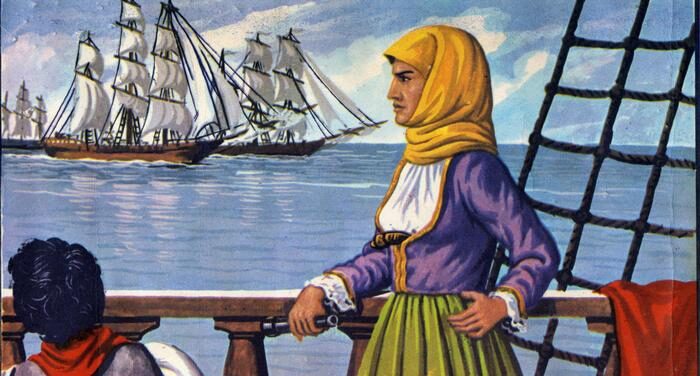Laskarina Bouboulina was not just a heroine. She was a phenomenon. A woman in a male-dominated era who dared not only to stand on equal footing with the men of the Revolution, but to surpass them. With bravery, insight and dedication, she wrote her name alongside the protagonists of Freedom – with ships, battles and her whole soul given to the Greece that had not yet been born.
A life against the waves
Laskarina was born in 1771 in the prison of Constantinople, where her mother, the wife of a charioteer who had rebelled against the Turks, was being held. Having lost her father before he could hold her in his arms, the little girl grew up in Spetses, where she was introduced to the world of seafaring and commerce. At a young age she married twice, and lost both her husbands at sea. Her second husband, Captain Dimitris Bouboulis, left her a huge fortune and a substantial naval fleet. Laskarina did not fold. Instead, she took the helm, literally and figuratively. Without ever bowing to the conventions that wanted women “invisible,” she moved like a leader, a businesswoman, a general.

Secret Friendly, overt revolutionary
Shortly before the outbreak of the Struggle, Bouboulina joined the Society of Friends informally, the only woman with such access. With her personal wealth she built and equipped the legendary ship “Agamemnon”, the largest Greek warship of the time. In 1821, without waiting for orders, she raised the flag of the revolution and threw herself into battle. At the head of her fleet, she participated in the sieges of Nafplio and Monemvasia, supplying troops, coordinating attacks, rescuing civilians. In her house in Spetses, she hosts fighters, discusses strategies and plans the course of the Struggle. She becomes one with the history of the Fatherland – and with its wounds.
Mother, ally and tragic figure
Bouboulina did not only fight with ships. She was pained by the loss of her son, Panos, during the civil conflicts among the Greeks, when the Revolutionaries killed each other for power. She did not break. She continued to speak of unity, of freedom not as a conquest but as a way of life. When power passed into the hands of the Bavarians, Bouboulina was considered dangerous. She was exiled, marginalized and finally met her death in 1825, at the age of only 54, by a bullet, in a fight with a family of Cuccians over the issue of her daughter’s marriage. A tragic and unjust ending for a woman who had given her all.
“We fight for our country, not for our ships”
Bouboulina herself did not leave any writings, but testimonies of her words and attitude are recorded. In a letter to the precursors of Moria, during the civil strife, she is said to have addressed herself with dignity and passion, saying:
“I am a woman, but I fight for my country, not for my ships or my honor. For your children, and for the blood that is unjustly shed.”
Her words were simple, yet full of meaning. She was not fighting for personal glory, but for an ideal that transcended even her own loss. It was this moral superiority that made her unique. She was not just a fighter. She was a conscience.
The honor she deserved
The Tsar of Russia, recognizing her contribution, posthumously awarded her the title of Admiral of the Russian Navy. Greece, decades later, began to restore her memory: her house in Spetses became a museum, her name was given to ships, schools, streets and statues. Today, Bouboulina is not just a symbol of female power. She is a timeless reminder that the passion for freedom has no gender, knows no boundaries, and asks no permission.
A ship with a soul
Bouboulina lived as she ruled: with vigour, insight and determination. She was a ship with a soul, unafraid of the storm. And if history has written the names of the generals, she charted her own course – with sails billowing with a thirst for freedom.



